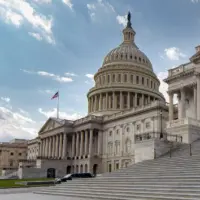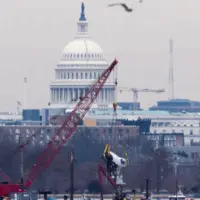
(WASHINGTON) — Congress is out of town this week, but when lawmakers return on Monday, Sept. 29, they’ll be facing an immediate government funding deadline. If Congress doesn’t act before Wednesday, Oct. 1, there will be a government shutdown.
Right now, congressional leaders are busy blaming one another for the looming shutdown, but no clear path is emerging for how funding might be approved.
Here’s what you need to know with less than a week until a possible government shutdown:
What needs to happen to avert a government shutdown?
The government runs out of funding as the clock strikes midnight from Tuesday, Sept. 30 to Wednesday, Oct. 1. To avoid that shutdown, Congress must pass either a short-term funding bill, called a continuing resolution (or CR), or they must approve 12 separate full-year funding bills.
Congress does not have time to finish work on the full-year funding bills before the deadline, so they’ll need a stopgap bill.
Unlike the One Big Beautiful Bill Act, funding bills need at least 60 votes to pass in the Senate. That means any government funding solution will require at least seven Senate Democrats to pass if every Republican supports the proposal.
In a Washington under total Republican control, government funding is one of few must-pass pieces of legislation that requires Democratic votes.
Current state of play
Democrats and Republicans are currently locked in a staring contest. It’s not clear what, if anything, will be done to stop a shutdown next week.
Efforts to pass a short-term funding bill failed last week.
On Friday, House Republicans (and one Democrat) passed a bill that would have kept the government funded until Nov. 20. But within hours of the House action, Senate Democrats blocked the measure from passing the Senate and instead offered their own funding bill that included a number of health care provisions Democrats say are essential. Republicans blocked that bill from advancing in the Senate.
Since then, no new proposal has been offered. Congress is out of town this week with no plans to return early.
Trump cancels meeting with Democrats
Democrats have alleged that the White House and congressional Republicans have been unwilling to negotiate with them on a path forward on government funding.
After President Donald Trump said he would meet with Democratic leaders Chuck Schumer and Hakeem Jeffries at their request, the president reversed course on Tuesday morning.
“After reviewing the details of the unserious and ridiculous demands being made by the Minority Radical Left Democrats in return for their Votes to keep our thriving Country open, I have decided that no meeting with their Congressional Leaders could possibly be productive,” Trump posted on his social media channel.
Democrats have responded by saying that Trump is running away from the negotiation table and will own the shutdown as a result.
What Republicans, Democrats want
Republicans on Capitol Hill want Congress to pass a short-term funding bill without any additional add ons to keep the government funded at FY2024 levels through Nov. 20. Republicans say this will allow more time for Congress to work on the annual appropriations bills that they hope can be enacted before the next funding deadline. The White House has backed this approach.
Passing a short-term funding bill that doesn’t include any sort of major policy riders is pretty par for the course on Capitol Hill. Democrats advanced many of them while former President Joe Biden was in office. Republicans say Democrats are being disingenuous by not supporting this seven-week solution.
“If [Democrats] want to shut down the government, they have the power to do so, but if they think they are going to gain political points from shutting down the government over a clean nonpartisan CR, something they voted for 13 times under the Biden administration, I would strongly urge them to think again,” Majority Leader John Thune said on Friday ahead of the Senate vote to block this short-term funding bill.
Republicans say that other policy priorities should be debated as part of the annual appropriations process, not as part of a short-term funding solution.
Democrats, on the other hand, want to use the funding deadline as leverage to secure health care-related wins and to restore cuts to Medicaid made by the One Big Beautiful Bill Act that Republicans passed in July.
There’s a lot of health care provisions that Democrats outlined in their counter proposal that was rejected by the Senate last week – including the expansion of expiring Obamacare tax credits for federally backed health insurance premiums and the reversal of the Medicaid cuts that were signed into law under Trump’s megabil in July.
The non-partisan Congressional Budget Office estimated that the Democrat’s health care proposals would cost $1.4 trillion over 10 years. Democrats have said they’re willing to negotiate with Republicans, so this package should be viewed as an opening offer and not a set of red lines.
Democrats have repeatedly insisted they must secure health care-related wins to approve a funding package, but they have not yet been explicit about what specific wins they must secure in order to keep the government funded.
What’s different this time around?
In March, 10 Senate Democrats voted with Republicans to pass a continuing resolution to hold funding levels constant through the end of the fiscal year on Oct. 1.
But now, what we’re seeing is a role reversal for both parties.
Many times in the past several years it has been Republicans pushing for policy concessions on short-term funding bills while Democrats have repeatedly beat the drum for a clean short-term funding extension.
This time though, it’s Democrats who are saying they must get policy concessions while Republicans challenge them to accept a stopgap funding solution with nothing attached. It bucks the historical trend.
What happens if there is a government shutdown?
If there is a government shutdown, millions of federal employees will go without a paycheck and many — such as airport security officers, air traffic controllers and members of the military — will be told to come to work anyway. ICE agents also go without pay. National parks will close and the Smithsonian museums also typically close within a few days.
Federal contractors are not required to work and are also not guaranteed backpay.
Social Security continues to be distributed, though there can be slow downs.
Copyright © 2025, ABC Audio. All rights reserved.














